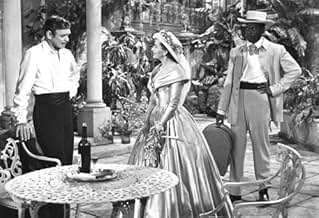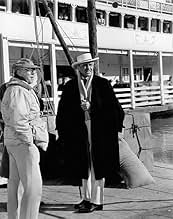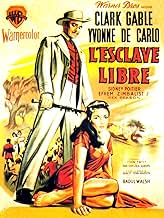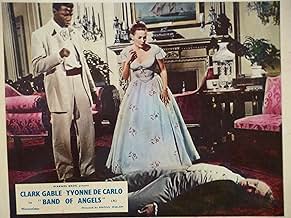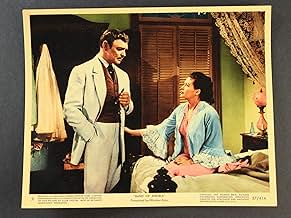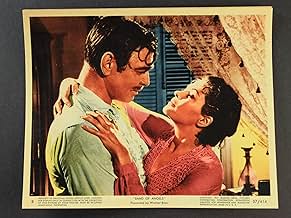Amantha Starr crece como una privilegiada belleza sureña antes de la guerra, pero tras la muerte de su padre arruinado, su mundo se desmorona cuando descubre que su madre era negra.Amantha Starr crece como una privilegiada belleza sureña antes de la guerra, pero tras la muerte de su padre arruinado, su mundo se desmorona cuando descubre que su madre era negra.Amantha Starr crece como una privilegiada belleza sureña antes de la guerra, pero tras la muerte de su padre arruinado, su mundo se desmorona cuando descubre que su madre era negra.
- Dirección
- Guionistas
- Elenco
- Jimmee
- (as Russ Evans)
- Gillespie
- (sin créditos)
- Auction Guest
- (sin créditos)
- Auctioneer
- (sin créditos)
- Maj. Gen. Benjamin Butler
- (sin créditos)
Opiniones destacadas
That now out of the way, there's more at work that to my mind saves this movie. Supported by Sidney Poitier and Efrem Zimbalist Jr., Clark Gable and Yvonne deCarlo play the lead pair, who openly 'live in sin' and are otherwise reprehensible. All the same, both are portrayed sympathetically. Set in the 'Gone with the Wind' period, Gable plays an ex-slaver and cotton-grower who once prowled his plantation's slave shacks for his jollies. She is the shameful issue of a liaison with a slave on another plantation, and it's even suggested that she fools around on Gable while he's away on business.
This movie's clearly no gem, but it's no dreck. However maudlin and overdone, its basic theme of the redemptive power of love is fairly well handled. The era and settings are unusual and atmospheric enough to hold the viewer's interest, and I had no difficulty with plot over-entanglements even if my credulity was strained now and then.
It may well have been Yvonne De Carlo's best film, and Gable also did a fair job with an okay script (something not unusual while the studios struggled to survive). Sidney Poitier has a small but meaty role as an educated slave with a deep grudge. Efrem Zimbalist Jr. got his first speaking part in this film, and acquits himself smoothly with limited material. Max Steiner grinds out a spotty sountrack that's effective only in the chase scenes, and then only just ...yet a Rozsa or Korngold he never was.
The Warnercolour's glorious, and the art direction is especially fine, with atmospheric scenes especially in the Gable character's New Orleans pied-a-terre and (less so) in his plantation mansion. Mind you, it's all 100% 1950s Hollywood, and very pristine and polished ...but let's not expect too much from the era, when Edith Head primped up the women and the idea of onscreen grime, sweat or facial stubble as far off as spaghetti westerns.
A fairly good film from the 50s, in short: its eventful, sometimes quirky plot, more than passable acting and some unusual settings make most of it very watchable.
Indeed, no one is at their best in this film--not Clark Gable, as an older and tired looking version of Rhett Butler, nor beautiful Yvonne de Carlo--each given some of the worst dialogue any actors have ever been saddled with. It's a murky tale of a plantation owner in love with a woman of mixed ancestry. Patric Knowles and Sidney Poitier try to bring some semblance of dignity to the acting but there's simply too much tripe to allow anyone to look good. And by the way, it's not based on a Frank Yerby novel, as someone has said previously. It's based on a novel by Robert Penn Warren which I hope was better than the movie. Had to be.
Only the Steiner score provides a point of interest. Certainly nowhere near the level of that other Civil War epic starring Gable. No way!
One of his new charities is Yvonne DeCarlo who received one rude shock when her father died. Her mom was black, one of the plantation slaves and she is technically one also. She's not the mistress of her father's plantation, she along with the rest of the property, real and human, is to be sold for back taxes.
Gable buys her and sets her up in his New Orleans home. Also in that house is a young black man named Ra-Ru played by Sidney Poitier. Poitier, in violation of the laws of the time, has been educated. And he's acquired enough education to appreciate the situation he's in. He's got a great hate for his benefactor who he really sees as no different than other, crueler slave holders.
Today's audience which has seen Steven Spielberg's great true film Amistad about the illegal African slave trade, can appreciate far better Gable's dilemma. It's as if the owners of the Amistad grew a conscience. Gable's description of life in the slave trade when he levels with Yvonne DeCarlo is a high point of the film as is his description of the rescue of an African baby who grew up to be Sidney Poitier.
The film does borrow liberally from Gone With the Wind in terms of Gable's character. But it also borrows from Birth of a Nation. Catch the scenes at his plantation on the delta when his slaves greet him and DeCarlo coming off the riverboat. Very much in keeping with that flawed classic. Had Gable done this film at his former studio MGM, I'm sure Ava Gardner would have been cast opposite him. Though DeCarlo is fine, Ava would have made the part a classic.
Actually it's Poitier who walks off with the acting honors here. His Ra-Ru is filled with fire and passion. What Gable thought of as an act of kindness, is not perceived by Poitier as that. He's educated enough to see exactly the institution of slavery for the dehumanizing force that it is. His confrontation with another plantation owner, Patric Knowles, when he tries to force himself on DeCarlo is not something one with the slave mentality would do. Knowles makes a big mistake in assuming Poitier thinks that way.
Actually Patric Knowles has another important scene with Gable after Poitier assaults Knowles and escapes. Gable has no use for him at all. He's originally from New England and doesn't like southern aristocrats as a group. Though Knowles is reputed to be a dead shot as a duelist, Gable faces him down and makes him turn tail in my favorite scene in the film.
Band of Angels did not get the best of reviews at the time it came out. I think it was ahead of its time and can be better appreciated by audiences today.
¿Sabías que…?
- TriviaThe film proved to be a complete failure on release, both critically and commercially. Clark Gable was annoyed by the comparisons with Lo que el viento se llevó (1939) and instructed his agent, "If it doesn't suit an old geezer with false teeth, forget about it." He also decided to part company with Raoul Walsh, previously one of his favorite directors.
- ErroresAt 40 minutes, the heroine takes off her stockings, which were not yet available in those days.
- Citas
Amantha Starr: You say you won't touch me. You give me your *word* as a gentleman. Well, what's to stop you from breakin' your word late one night and forcin' yourself on me while I sleep?
Hamish Bond: [grins] Only the word of a gentleman.
Amantha Starr: [late that night, unable to sleep] He said he wouldn't. But those are his footsteps, coming down the hall. Coming closer!
Amantha Starr: [listens tensely] He didn't! Not tonight, anyway. Why not?
[Amantha frowns at first, then thinking it over, gradually falls asleep]
- ConexionesEdited into La classe américaine (1993)
- Bandas sonorasBand of Angels
(uncredited)
Music by Max Steiner
Lyrics by Carl Sigman
[Sung by chorus over main titles]
Selecciones populares
- How long is Band of Angels?Con tecnología de Alexa
Detalles
- Fecha de lanzamiento
- País de origen
- Idiomas
- También se conoce como
- Band of Angels
- Locaciones de filmación
- Productoras
- Ver más créditos de la compañía en IMDbPro
Taquilla
- Total a nivel mundial
- USD 315
- Tiempo de ejecución
- 2h 5min(125 min)
- Relación de aspecto
- 1.85 : 1


